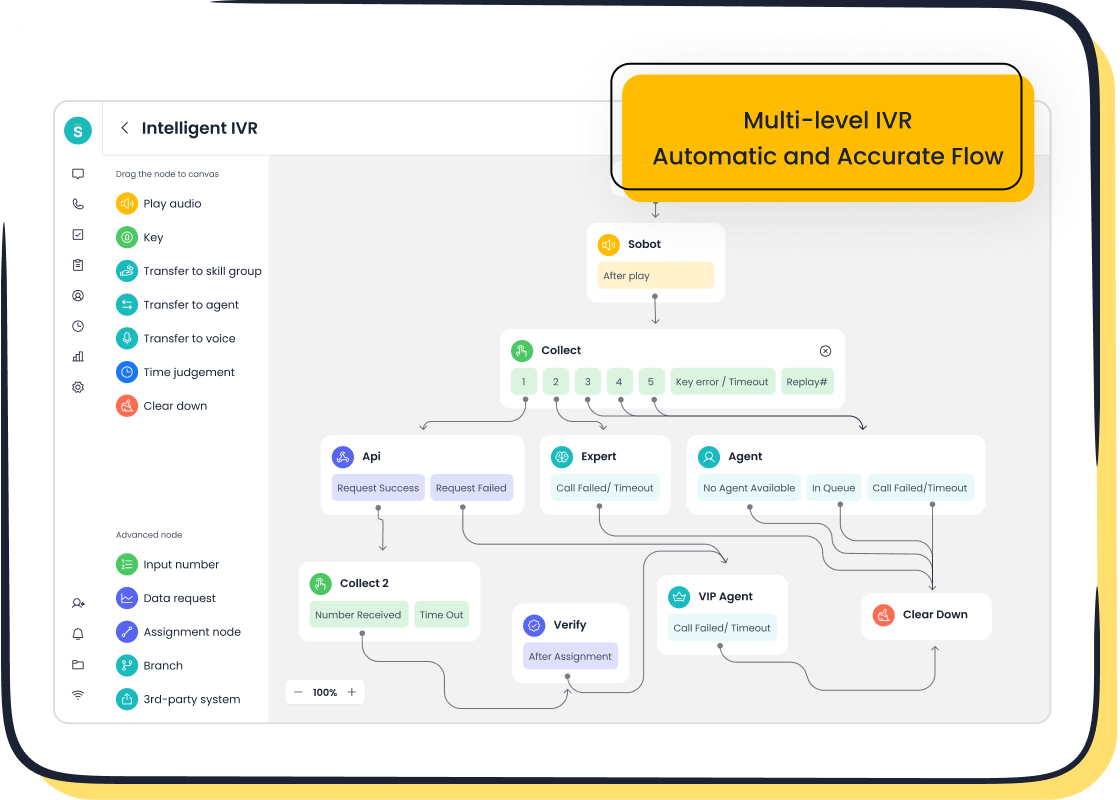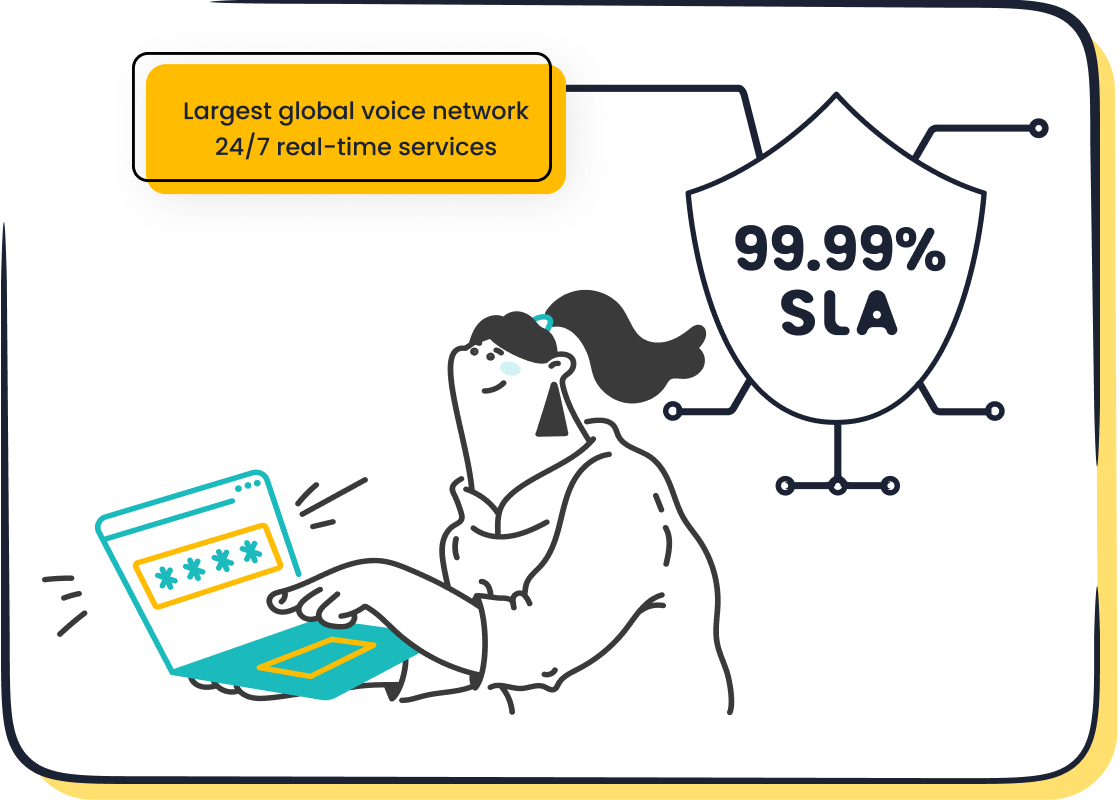Traditional PBX vs Cloud PBX Which Fits Your Business

Choosing the right Private Branch Exchange (PBX) system can significantly impact your business operations. Your decision often hinges on operational goals like cost savings, scalability, and flexibility. For instance, cloud PBX offers reduced upfront costs and global availability, enabling remote access for employees. Traditional PBX, on the other hand, provides robust on-site infrastructure for businesses with stable communication needs. Companies like Sobot enhance cloud PBX solutions with features like intelligent call routing and real-time monitoring, ensuring seamless communication and operational efficiency.
Understanding Private Branch Exchange (PBX) Systems
What is a Private Branch Exchange (PBX)?
Definition and Purpose
A private branch exchange (PBX) is a telephone system used within organizations to manage internal and external calls. It acts as a centralized hub, connecting multiple phone lines to a single network. This system eliminates the need for individual phone lines for each employee, reducing costs and improving efficiency. PBX systems also provide advanced features like call forwarding, voicemail, and conferencing, which enhance business communication.
Historically, PBX systems emerged in the 1960s as large, manually operated setups. Over time, they evolved into compact, automated systems that became accessible to small and medium-sized businesses. Today, PBX systems are integral to modern business communication systems, offering flexibility and scalability to meet diverse needs.
Role in Business Communication
PBX systems play a crucial role in streamlining business communications. They enable seamless interaction between employees and customers, ensuring efficient call management. For example, features like auto attendants and call routing help direct calls to the right departments, saving time and improving customer satisfaction. In industries like retail and financial services, PBX systems support high call volumes while maintaining quality service.

Modern PBX systems, such as cloud-based solutions, further enhance communication by offering global availability and integration with tools like Sobot's Voice/Call Center. These systems allow businesses to manage calls across multiple locations without the need for extensive physical infrastructure, making them ideal for remote and hybrid work environments.
Types of PBX Systems
Traditional PBX
Traditional PBX systems rely on physical hardware installed on-site to manage calls. They are known for their reliability and consistent call quality, as they do not depend on internet connectivity. However, they require significant upfront investment in hardware and ongoing maintenance. These systems are best suited for businesses with stable communication needs and dedicated IT teams to manage the infrastructure.
Cloud-Based PBX (Cloud PBX)
Cloud-based PBX systems operate entirely over the internet, eliminating the need for physical hardware. They offer features like automatic backups, global accessibility, and seamless scalability. For instance, cloud PBX allows businesses to expand their communication capabilities without complex setups. Companies like Sobot enhance cloud PBX solutions with intelligent call routing and real-time monitoring, ensuring efficient and secure communication.
| Type of PBX System | Description | Pros | Cons |
|---|---|---|---|
| Traditional PBX | Relies on physical hardware for call routing. | Reliable call quality, hardware ownership. | Expensive, outdated. |
| Cloud-Based PBX | Operates over the internet. | Cost-saving, flexible, scalable. | Requires high-speed internet. |
Traditional PBX: Features and Applications
How Traditional PBX Works
Hardware and Infrastructure Requirements
Traditional PBX systems, also known as on-premises PBX, require specific hardware components to function effectively. These components are installed on-site and form the backbone of the system. Below is a table outlining the essential hardware:
| Hardware Component | Description |
|---|---|
| ISDN Interface Card | Connects to ISDN lines; options include cards from manufacturers like Digium and Sangoma. |
| Router with ISDN Voice Interfaces | Supports SIP; Cisco multiservice routers are a common choice. |
| Multi-port ISDN PCI Cards | Ensures compatibility with the system; selecting the right type and brand is crucial. |
This infrastructure ensures reliable communication without relying on internet connectivity. Businesses with stable communication needs often prefer this setup due to its dependability.
Common Features of Traditional PBX
Traditional PBX systems offer a range of features that enhance business communication. These include:
- Call forwarding
- Call transfer
- Call queue
- Voicemail
- Auto-attendant
These features make traditional PBX systems a reliable choice for managing internal and external calls. On-premises PBX systems handle call routing, manage extensions, and provide voicemail services, ensuring seamless communication within the organization.
Applications in Business
Industries That Commonly Use Traditional PBX
Industries with high call volumes and a need for consistent communication often rely on traditional PBX systems. Examples include:
- Healthcare: Hospitals and clinics use on-premises PBX to manage patient inquiries and internal communication.
- Hospitality: Hotels depend on traditional PBX for room service requests and guest communication.
- Manufacturing: Factories use these systems to coordinate operations and communicate with suppliers.
These industries benefit from the reliability and robust features of traditional PBX systems, ensuring uninterrupted communication.
Scenarios Where Traditional PBX Excels
Traditional PBX systems excel in scenarios where internet connectivity is unstable. For example, businesses in remote areas or regions with unreliable internet infrastructure can maintain consistent communication through landline-based systems. This reliability is critical for operations that depend on uninterrupted phone service, such as emergency response centers or customer support teams in rural locations.
Tip: If your business operates in an area with frequent internet outages, traditional PBX can provide a dependable solution for your communication needs.
Cloud-Based PBX: Features and Benefits
How Cloud PBX Works
Cloud Hosting and Accessibility
Cloud PBX operates by hosting communication hardware and software in the cloud. Unlike traditional PBX systems, which require on-site equipment, cloud-based solutions eliminate the need for physical infrastructure. All communication data is routed over the internet, enabling seamless call management from anywhere. You can configure your virtual PBX through a web browser, removing the need for technical expertise. This flexibility makes cloud PBX ideal for businesses with remote or hybrid teams.
Cloud technology also transforms financial management. It converts high upfront hardware costs into manageable operational expenses. Maintenance and updates are handled by the service provider, reducing IT overhead. This hosted PBX model ensures scalability, allowing you to expand services as your business grows.
Key Features of Cloud PBX
Cloud PBX systems offer advanced features that cater to modern business needs:
- Flexibility: Teams can connect from home offices or while traveling.
- Integration: Seamlessly connects with CRM platforms and tools like Sobot's Voice/Call Center.
- Advanced Features: Includes automated attendants, voicemail transcription, and HD video conferencing.
- Cost Efficiency: Eliminates expensive hardware investments.
- Reliability: Supports business growth without compromising communication quality.
These features optimize productivity and enhance customer interactions, making cloud-based PBX systems a preferred choice for businesses.
Applications in Business
Industries That Benefit from Cloud PBX
Cloud PBX systems benefit a wide range of industries:
| Industry Type | Benefits |
|---|---|
| Small to Medium-Sized Businesses | Cost-effective, scalable phone system without managing hardware. |
| Enterprises | Flexible communication solution across multiple office locations. |
| Remote and Hybrid Teams | Connectivity for staff regardless of location. |
| Customer Support Centers | Advanced call features like call routing and recording. |

For example, Sobot's Voice/Call Center integrates seamlessly with cloud PBX, offering intelligent call routing and real-time monitoring. This ensures efficient communication for businesses of all sizes.
Scenarios Where Cloud PBX Excels
Cloud PBX excels in scenarios requiring flexibility and scalability. Businesses with remote teams benefit from its ability to connect employees across different locations. Customer support centers leverage features like call recording and routing to improve service quality. Additionally, companies experiencing rapid growth can scale their communication needs without complex setups. Sobot's cloud-based phone system supports global telephony, ensuring reliable communication for businesses worldwide.
Tip: If your business prioritizes flexibility and cost efficiency, cloud PBX offers a robust solution tailored to your needs.
Key Comparison Factors for Business Phone Systems
Cost
Initial Setup Costs
When comparing PBX systems, initial setup costs can vary significantly. Traditional PBX systems require substantial upfront investments, including hardware and software. For example:
- Hardware and equipment costs range from $5,000 to $9,000.
- Software licensing costs add another $3,000 to $4,500.
- Installation and setup fees range between $1,000 and $1,500.
In contrast, cloud PBX systems eliminate the need for physical hardware. Businesses can start with as little as $400 for the first month of service. This makes cloud PBX a cost-effective option for companies seeking to minimize upfront expenses.
Long-Term Maintenance Costs
Traditional PBX systems incur ongoing maintenance costs, often reaching $3,000 to $4,000 annually. These costs cover hardware repairs, software updates, and IT support. Additionally, annual recurring costs for traditional systems can total $12,000 for a 20-person company.
Cloud PBX systems, however, operate on a subscription model. Businesses typically pay a monthly fee of $20 per user, amounting to $4,800 annually for 20 users. This model reduces long-term costs while offering greater flexibility and accessibility.
Scalability
Scaling with Traditional PBX
Scaling a traditional PBX system involves hardware upgrades, which can be time-consuming and costly. Adding new users or features often requires purchasing additional equipment and reconfiguring the system. This rigidity can hinder swift scalability, especially for growing businesses.

Scaling with Cloud PBX
Cloud PBX systems excel in scalability. You can easily add or remove users and features without hardware changes. This agility allows businesses to adapt quickly to changing demands. For instance, Sobot's Voice/Call Center integrates seamlessly with cloud PBX, enabling businesses to scale their communication systems effortlessly.
Flexibility
Remote Work Capabilities
Cloud PBX systems offer unmatched flexibility for remote work. Employees can access the business phone system from any device, including smartphones and laptops. Mobile apps and softphones enable seamless communication, enhancing productivity and collaboration. This makes cloud PBX ideal for remote or hybrid teams.
Integration with Tools like Sobot Voice/Call Center
Cloud PBX systems integrate with tools like Sobot's Voice/Call Center, providing a unified workspace for managing calls and customer data. Features like intelligent call routing and real-time monitoring improve efficiency. This integration ensures businesses can maintain high-quality communication while adapting to remote access needs.
Maintenance and Support
Maintenance Needs for Traditional PBX
Traditional PBX systems require regular upkeep to ensure smooth operation. You need to account for several maintenance tasks, including:
- Repair costs for hardware failures or software glitches.
- Fees for routine maintenance services provided by PBX vendors.
- Hardware upgrades to replace outdated components.
- Software updates and troubleshooting to maintain system performance.
- Occasional repairs for IP phones connected to the PBX system.
These systems demand a dedicated IT team or external support to handle these tasks. For example, if your business uses a traditional PBX, you might face downtime during hardware repairs or software updates. This can disrupt communication, especially in industries like healthcare or manufacturing, where consistent connectivity is critical.

Maintenance Needs for Cloud PBX
Cloud PBX systems simplify maintenance by shifting responsibilities to the service provider. You don’t need to worry about hardware repairs or software updates. Providers handle these tasks, ensuring your system stays up-to-date and functional. Automatic updates and backups reduce the risk of downtime or data loss. For instance, Sobot’s Voice/Call Center offers a 99.99% uptime guarantee, ensuring reliable communication for your business. This hands-off approach allows you to focus on core operations without the burden of managing complex infrastructure.
Security
Security Features of Traditional PBX
Traditional PBX systems offer robust security due to their lack of internet connectivity. This isolation protects your communication from online threats like hacking or phishing. Additionally, you have full control over the telephony infrastructure, allowing you to customize security measures based on your needs. However, manual backups and configurations can lead to human errors, increasing the risk of data loss. Businesses relying on traditional PBX must implement strict protocols to minimize these risks.
Security Features of Cloud PBX
Cloud PBX systems enhance security with advanced features like automatic backups and built-in redundancy. These mechanisms protect your data from loss or corruption. Additionally, cloud providers implement encryption and multi-factor authentication to safeguard your communication. For example, Sobot’s cloud-based solutions ensure secure data transfer and encrypted dialing, making them a reliable choice for businesses handling sensitive information. This level of security is particularly beneficial for industries like financial services or retail, where data protection is paramount.
Pros and Cons of Traditional PBX and Cloud PBX
Traditional PBX
Advantages
Traditional PBX systems offer several benefits that make them a reliable choice for certain businesses:
- Reliability: These systems do not depend on an internet connection, ensuring uninterrupted communication even in areas with poor connectivity.
- Power Backup: Many traditional PBX setups include an uninterruptible power supply, keeping your phone lines active during power outages.
- Control: You have complete ownership of the hardware, allowing you to customize the system to meet your specific needs.
Note: If your business operates in rural areas or regions with unstable internet, traditional PBX can provide a dependable solution.
Disadvantages
Despite their reliability, traditional PBX systems come with notable drawbacks:
- High Costs: Installation and maintenance expenses can strain your budget, especially for small businesses.
- Limited Scalability: Expanding the system requires additional hardware, which can be time-consuming and costly.
- Complex Installation: Setting up a traditional PBX system demands technical expertise and significant time investment.
- Lack of Mobility: These systems often lack integration with mobile devices, limiting flexibility for employees working remotely.
- Security Risks: Vulnerabilities in the system can expose your communication to potential threats.
Tip: Consider these limitations carefully if your business plans to scale or adopt remote work practices.
Cloud PBX
Advantages
Cloud PBX systems bring modern solutions to business communication with a range of advantages:
- Cost Savings: Avoid large upfront investments by opting for predictable monthly subscriptions.
- Scalability: Add or remove users and features effortlessly as your business grows.
- Remote Accessibility: Enable your team to connect from anywhere, supporting remote and hybrid work models.
- Advanced Features: Enjoy tools like auto-attendants, call forwarding, and voicemail-to-email.
- Reliability: Cloud infrastructure ensures business continuity with backup options.
- Ease of Use: Manage your system through user-friendly online dashboards.
- Enhanced Security: Benefit from data encryption and compliance with industry regulations.
- Integration: Seamlessly connect with tools like Sobot’s Voice/Call Center for intelligent call routing and real-time monitoring.
Example: Businesses like Weee! have leveraged cloud PBX solutions to improve efficiency and customer satisfaction, achieving a 96% satisfaction score with Sobot’s voice product.
Disadvantages
While cloud PBX systems are highly versatile, they do have some limitations:
- Internet Dependency: A strong internet connection is essential. Poor connectivity can disrupt communication.
- Security Concerns: Cloud systems are more vulnerable to cyber threats, making it crucial to choose a provider with robust security measures.
Tip: Ensure your internet infrastructure is reliable and inquire about your provider’s security protocols before adopting a cloud PBX system.
Choosing the Right Business Phone System
When to Choose Traditional PBX
Businesses with On-Site IT Teams
If your business has a dedicated IT team, traditional PBX can be a reliable choice. These systems require on-site hardware and regular maintenance, which your IT staff can manage effectively. Industries like e-commerce and hospitality often prefer traditional PBX for its robust infrastructure. For example, hotels use these systems to handle guest communication and room service requests efficiently. With full control over the hardware, you can customize the system to meet your specific needs.
Companies with Stable, Long-Term Needs
Traditional PBX suits businesses with consistent communication requirements. If your operations rely on stable call volumes and minimal scalability, this system offers a dependable solution. Manufacturing companies, for instance, benefit from its reliability in coordinating operations and supplier communication. The lack of internet dependency ensures uninterrupted service, even in areas with poor connectivity.
When to Choose Cloud PBX
Businesses with Remote or Hybrid Workforces
Cloud PBX is ideal for businesses embracing remote or hybrid work models. It allows employees to connect from any location using internet-enabled devices. Startups and small businesses also benefit from its low installation and maintenance costs. For example, cloud PBX provides a professional appearance with consistent business phone numbers, enhancing collaboration across distributed teams.
Companies Seeking Scalability and Flexibility
If your business is growing, cloud PBX offers unmatched scalability. You can add or remove users and features without hardware upgrades. This flexibility supports businesses experiencing rapid expansion. For instance, cloud PBX systems integrate seamlessly with tools like Sobot's Voice/Call Center, enabling you to scale communication systems effortlessly while maintaining high-quality service.
How Sobot Voice/Call Center Enhances Cloud PBX

Features Supporting Remote Work
Sobot Voice/Call Center enhances cloud PBX by offering features tailored for remote teams. Intelligent IVR ensures calls reach the right agents, while the unified workspace centralizes communication channels. These tools improve efficiency and reduce resolution times. For example, Weee! achieved a 20% increase in agent productivity and a 96% customer satisfaction score by leveraging Sobot's voice solutions.
Integration and Scalability Benefits
Sobot's Voice/Call Center simplifies scalability and integration for cloud PBX users. Its seamless integration with existing business applications streamlines workflows and improves customer service. Flexible extension distribution eliminates hardware constraints, allowing employees to connect from anywhere. Additionally, Sobot's pay-as-you-go model ensures you only pay for what you need, making it a cost-effective solution for growing businesses.
Choosing between traditional PBX and cloud PBX depends on your business's unique needs. Traditional PBX offers reliable communication with on-site control, while cloud PBX provides flexibility, scalability, and cost savings. The table below highlights their key differences:
| Feature | Cloud-Based PBX | Traditional PBX |
|---|---|---|
| Backup Mechanisms | Automatic backups in secure locations | Manual backups, prone to human error |
| Global Availability | Seamless communication across locations | Limited to physical infrastructure |
| Configuration Flexibility | Easy web-based management | Complex manual configuration |
| Cost Savings | Reduced maintenance and hardware costs | Higher costs due to maintenance |
To choose the right system, evaluate your communication needs. On-premise systems suit businesses with dedicated IT teams, while hosted systems work best for startups or remote teams. Sobot's Voice/Call Center enhances cloud PBX with intelligent call routing, real-time monitoring, and global accessibility, ensuring seamless communication for modern businesses.
FAQ
What is the main difference between traditional PBX and cloud PBX?
Traditional PBX relies on physical hardware installed on-site, while cloud PBX operates over the internet. Traditional systems suit businesses with stable communication needs. Cloud PBX offers flexibility, scalability, and cost savings, making it ideal for remote or hybrid teams. Sobot’s Voice/Call Center enhances cloud PBX with intelligent call routing and real-time monitoring.
Tip: Choose cloud PBX if you prioritize remote access and scalability.
How does cloud PBX improve remote work capabilities?
Cloud PBX allows employees to connect from anywhere using internet-enabled devices. Features like mobile apps and softphones ensure seamless communication. For example, Sobot’s Voice/Call Center integrates with cloud PBX, offering tools like intelligent IVR and unified workspaces to enhance productivity for remote teams.
Is cloud PBX secure for business communication?
Yes, cloud PBX includes advanced security features like encryption and multi-factor authentication. Providers like Sobot ensure secure data transfer and compliance with industry standards. For instance, Sobot’s Voice/Call Center guarantees encrypted dialing and a 99.99% uptime, making it a reliable choice for businesses handling sensitive information.
Can small businesses afford cloud PBX systems?
Cloud PBX systems operate on a subscription model, making them affordable for small businesses. You avoid high upfront costs for hardware. For example, Sobot’s pay-as-you-go model ensures you only pay for what you need, offering a cost-effective solution for startups and growing companies.
How does Sobot enhance cloud PBX solutions?
Sobot’s Voice/Call Center integrates seamlessly with cloud PBX, offering features like intelligent call routing, real-time monitoring, and global telephony support. Businesses like Weee! have achieved a 96% customer satisfaction score by leveraging Sobot’s solutions to improve efficiency and streamline communication.
Example: Learn more about Sobot’s Voice/Call Center here.
See Also
Best VoIP Solutions for Small Enterprises in 2024
Leading Cloud Contact Center Options for Businesses in 2024
Comprehensive Reviews of Cloud Contact Center Services 2024
Notable VoIP Software Choices to Consider in 2024
Comparative Analysis of Leading Interactive Voice Response Software
